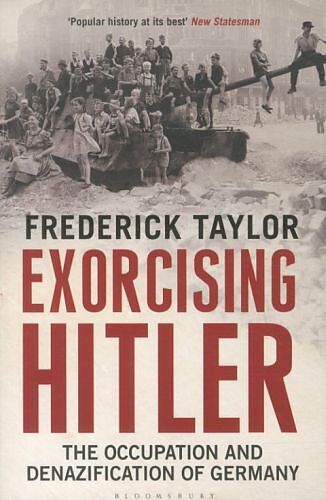Exorcising Hitler: The Occupation and Denazification of Germany
Einband:
Poche format B
EAN:
9781408822128
Untertitel:
The Occupation and Denazification of Germany
Genre:
Geschichte
Autor:
Frederick Taylor
Herausgeber:
Bloomsbury Publishing PLC
Auflage:
Repr.
Anzahl Seiten:
438
Erscheinungsdatum:
01.03.2012
ISBN:
1408822121
Seit dem Ende des Römischen Reichs gab es zumindest in Europa keine Parallele zum Untergang Deutschlands 1945. Nach nur 12 Jahren NS-Herrschaft lag das Land in Ruinen: die Städte zerstört, die Industrie zerschlagen, das kulturelle Erbe unrettbar.
Zusatztext 'Taylor's book is popular history at its best! essential reading for anyone who is interested in the Nazis and wants to know what happened next.' Informationen zum Autor Frederick Taylor Klappentext The first major history of what happened in Germany immediately after the Second World War 'Frederick Taylor is one of the brightest historians writing today.' Newsweek 'Taylor's book is popular history at its best, essential reading for anyone who is interested in the Nazis and wants to know what happened next.' New Statesman Germany had entered the twentieth century united, prosperous, and strong, admired by almost all humanity for its remarkable achievements. By 1945 it was a broken shell: its great cities lay in ruins and its shattered industries and cultural heritage seemed utterly beyond saving. The Germans themselves had come to be regarded as evil monsters. After six years of warfare how were the exhausted victors to handle the end of a horror that to most people seemed without precedent?In Exorcising Hitler , Frederick Taylor tells the story of Germany's year zero and what came after. As he describes the final Allied campaign, the hunting down of the Nazi resistance, the vast displacement of peoples in central and eastern Europe, the attitudes of the conquerors, the competition between Soviet Russia and the West, the hunger and near starvation of a once proud people, the initially naive attempt at expunging Nazism from all aspects of German life and the later more pragmatic approach, we begin to understand that despite almost total destruction, a combination of conservatism, enterprise and pragmatism in relation to former Nazis enabled the economic miracle of the 1950s. And we see how it was only when the '60s generation (the children of the Nazi era) began to question their parents with increasing violence that Germany began to awake from its 'sleep cure'.The first major history of what happened in Germany immediately after World War Two Zusammenfassung The first major history of what happened in Germany immediately after World War Two...
'Taylor's book is popular history at its best, essential reading for anyone who is interested in the Nazis and wants to know what happened next.'
Vorwort
The first major history of what happened in Germany immediately after World War Two
Autorentext
Frederick Taylor
Klappentext
The first major history of what happened in Germany immediately after the Second World War 'Frederick Taylor is one of the brightest historians writing today.' Newsweek 'Taylor's book is popular history at its best, essential reading for anyone who is interested in the Nazis and wants to know what happened next.' New Statesman Germany had entered the twentieth century united, prosperous, and strong, admired by almost all humanity for its remarkable achievements. By 1945 it was a broken shell: its great cities lay in ruins and its shattered industries and cultural heritage seemed utterly beyond saving. The Germans themselves had come to be regarded as evil monsters. After six years of warfare how were the exhausted victors to handle the end of a horror that to most people seemed without precedent? In Exorcising Hitler, Frederick Taylor tells the story of Germany's year zero and what came after. As he describes the final Allied campaign, the hunting down of the Nazi resistance, the vast displacement of peoples in central and eastern Europe, the attitudes of the conquerors, the competition between Soviet Russia and the West, the hunger and near starvation of a once proud people, the initially naive attempt at expunging Nazism from all aspects of German life and the later more pragmatic approach, we begin to understand that despite almost total destruction, a combination of conservatism, enterprise and pragmatism in relation to former Nazis enabled the economic miracle of the 1950s. And we see how it was only when the '60s generation (the children of the Nazi era) began to question their parents with increasing violence that Germany began to awake from its 'sleep cure'.
Zusammenfassung
The first major history of what happened in Germany immediately after World War Two

Leider konnten wir für diesen Artikel keine Preise ermitteln ...
billigbuch.ch sucht jetzt für Sie die besten Angebote ...
Die aktuellen Verkaufspreise von 6 Onlineshops werden in Realtime abgefragt.
Sie können das gewünschte Produkt anschliessend direkt beim Anbieter Ihrer Wahl bestellen.
Loading...
Die aktuellen Verkaufspreise von 6 Onlineshops werden in Realtime abgefragt.
Sie können das gewünschte Produkt anschliessend direkt beim Anbieter Ihrer Wahl bestellen.
| # | Onlineshop | Preis CHF | Versand CHF | Total CHF | ||
|---|---|---|---|---|---|---|
| 1 | Seller | 0.00 | 0.00 | 0.00 |
